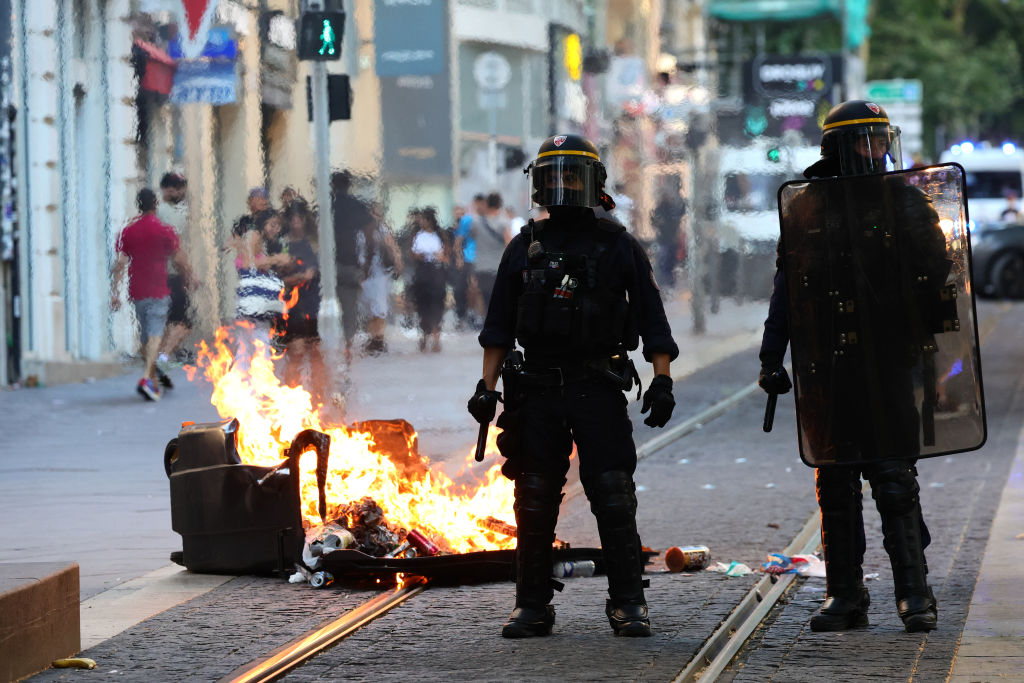


Emmanuel Macron broke his silence about the recent riots in France at the start of this week. In a speech in New Caledonia in the southwest Pacific, the president of the Republic declared that the country required a “return to authority at every level.” He added: “The lesson I draw from this is order, order, order.”
There was a certain irony to the president’s proclamation. He spoke as a crisis erupted in France, at the heart of which is a power struggle between the police and the justice system.
Resentment has been festering for a number of years within the police — among senior officers as well as the rank and file — that that country’s magistrates don’t much like them. They believe that much of the judiciary leans to the left politically and is more concerned with victims’ rights than supporting police officers in what has become an increasingly violent occupation.
They believe that much of the judiciary leans to the left politically and is more concerned with victims’ rights than supporting police officers
The police are well aware of the hostility they face from some left-wing politicians, mainly Jean-Luc Mélenchon’s La France Insoumise, an animus they feel is shared by some magistrates. “I don’t want to put everyone in the same basket, let’s be clear,” said Laurent Martin de Fremont, a police union spokesman this week. “But there is now a section of the judiciary that hates the police.”
De Fremont’s beat is the Alpes-Maritimes department, which includes the city of Nice. Earlier this month a man driving a stolen car allegedly attempted to run down three police officers, one of whom was injured as he jumped clear of the vehicle. The police believed it was a clear case of attempted murder but a magistrate downgraded the charge to “violence” and “resisting arrest.” In response about 100 officers gathered in front of the central police station in Nice to express their displeasure at the decision.
That protest, however, is minor compared to the anger further down the coast in Marseille. Last Thursday four officers were charged with assaulting a young man during the riots at the start of the month. One of the quartet has been remanded in custody, and it was specifically that fact that has caused uproar.
Within hours dozens of the officer’s colleagues had assembled outside a Marseille courthouse in a show of support, and the next day policemen and women began calling in sick or informing their superiors they will work only according to “code 562.” As officers are not allowed to strike, this code is the closest the police can come to taking industrial action, restricting them to answering emergency calls only.
The protest action, which has spread to Paris and Lyon, was endorsed on Sunday by France’s most senior policeman, Frédéric Veaux, the director general of the national police (DGPN). He hailed the courage and resolve of rank-and-file officers during the six days of rioting and stated that “before a possible trial, a police officer has no place in prison, even if he or she may have committed faults or serious errors in the course of his or her work.”
Veaux’s comments were subsequently supported by Laurent Nunez, the chief of police in Paris, and most right-leaning politicians and members of the public have also thrown their weight behind the police action. Eighty-five percent of respondents to an online poll in Le Figaro “understand” why the police are protesting, as does Gérald Darmanin, the Minister of the Interior.
Initially unresponsive to the Marseille protest — perhaps a reflection of his government’s hesitancy about how to react — Darmanin met several police union representatives on Thursday and he reiterated his “respect” for their work. “We get the feeling that our minister supports the police and understands the anger of the officers,” said Olivier Varlet, secretary general of UNSA union.
The left is less sympathetic and most echo the view of Olivier Faure, the leader of the Socialist Party, who accused the police of “putting itself above the law.” On Friday, Faure called for Darmanin, Veaux and Nunez to resign for “defying” the Republic and encouraging the risk of “sedition.”
The judiciary has also voiced its alarm at some of the comments made by police officers in recent days. Cécile Mamelin, vice-president of the magistrates union, expressed her “support” for the police, acknowledging the good work they do in difficult circumstances. But she cautioned that to “speak out unreservedly, when legal recourse exists for police officers as for any other citizen, is tantamount to undermining the very foundations of the rule of law.”
The young man who was allegedly attacked by the four officers, all of whom were in plain clothes, has undergone three operations to repair the damage to his skull, one side of which has been left permanently disfigured.
In the middle of the stand off between the police and the judiciary is Macron. He infuriated the police last month when, in reacting to the fatal shooting of Nahel, the teenager whose death sparked the riots, he called the actions of the officer who fired the shots “inexplicable” and “unforgivable.”
That is for a court to judge, as with the four officers charged with attacking the young man in Marseille. Macron’s challenge is to restore order to his country, starting with resolving the bitter dispute between his police and the judiciary.
This article was originally published on The Spectator’s UK website.
